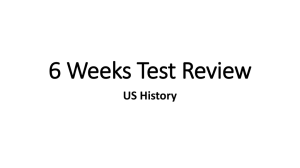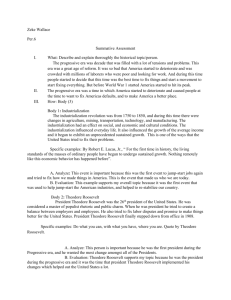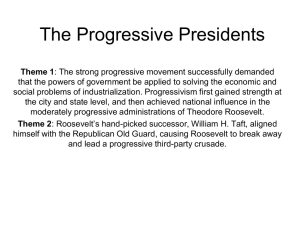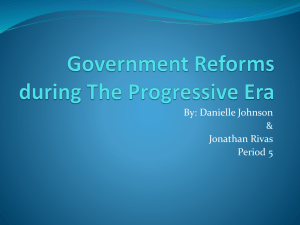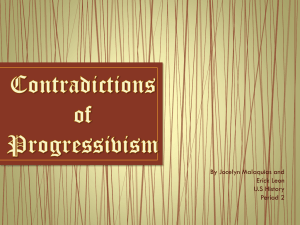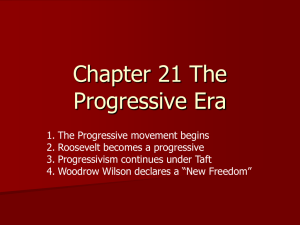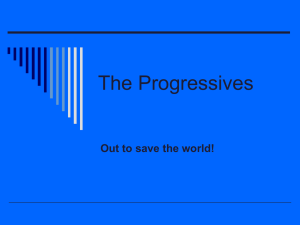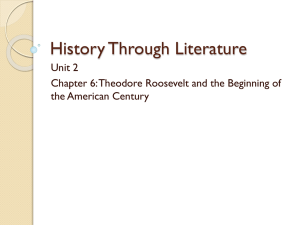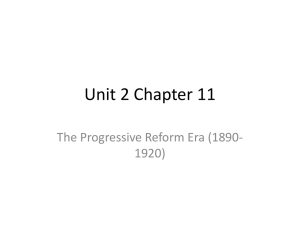Chapter 23 Guiding Questions
advertisement
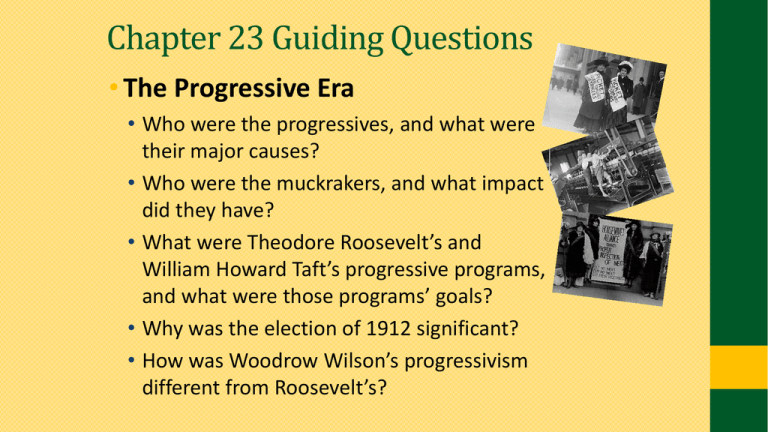
Chapter 23 Guiding Questions • The Progressive Era • Who were the progressives, and what were their major causes? • Who were the muckrakers, and what impact did they have? • What were Theodore Roosevelt’s and William Howard Taft’s progressive programs, and what were those programs’ goals? • Why was the election of 1912 significant? • How was Woodrow Wilson’s progressivism different from Roosevelt’s? Chapter 23 - The Progressive Era Elizabeth Cady Stanton In this 1870s engraving, Stanton speaks at a meeting of the National Woman Suffrage Association. Chapter 23 - The Progressive Era Which states first gave women the right to vote? Why did it take fifty-one years, from Wyoming’s grant of full suffrage to women until ratification of the Nineteenth Amendment, for women to receive the right to vote? How was suffrage part of a larger women’s reform movement? Chapter 23 - The Progressive Era Cover of McClure’s Magazine, 1902 This cover features Ida Tarbell’s muckraking series on the Standard Oil Company. Chapter 23 - The Progressive Era Child labor was commonplace A young girl working as a spinner in a cotton mill in Vermont, 1910. From CHAPTER 18 – Mother Jones Big Business and Organized Labor • “I’m not a humanitarian, I’m a hell-raiser.” • Lost her husband and four children to a yellow fever epidemic in Memphis (1867) • Moved to Chicago and saw her dressmaking shop, home, and belongings destroyed in the great fire of 1871 • Drifted into the labor movement and dedicated her life to the cause of wage workers and their families • Traveled to speak for the Knights of Labor, the United Mine Workers, other unions and the Socialist party • Promoted higher wages, shorter hours, safer workplaces and restrictions on child labor • Organized women and children to march and get things done • “You don’t need to vote to raise hell.” Chapter 23 - The Progressive Era • The meat industry • Pigs strung up along the hogscraping rail at Armour’s packing plant in Chicago, ca. 1909. Chapter 23 - The Progressive Era Taylorism and Efficiency • Frederick Winslow Taylor - The Principles of Scientific Management (1911) • Wealthy Quaker Family • Perfectionist as a child • Could have gotten an education and lived out his wealth • Asks a factory owner if he can be an apprentice (would do it for free) • Was asked to be a foreman over his “gang” • Demands efficiency • Begins quest for scientific management Chapter 23 - The Progressive Era Roosevelt’s duality Roosevelt’s energy, self-righteousness, and impulsiveness elicited sharp reactions. Theodore Roosevelt as an “apostle of prosperity.” Chapter 23 - The Progressive Era Roosevelt’s duality Roosevelt’s energy, self-righteousness, and impulsiveness elicited sharp reactions. Theodore as a Roman tyrant. Chapter 23 - The Progressive Era “The Lion-Tamer” Theodore Roosevelt confronts the beasts of the steel trust, the oil trust, the beef trust, and others in the arena of Wall Street. Chapter 23 - The Progressive Era Roosevelt Progressivism • The Square Deal • Regulating Trusts and Railroads • Cleaning up the meat and drug industries Chapter 23 - The Progressive Era Taft Progressivism • Continued Trust Busting • Continued Tariff Reform • BUT, many saw the tariff reductions as weak. Chapter 23 - 1912 Election Why was Taft so unpopular? How did the division between Roosevelt and Taft give Wilson the victory? Why was Wilson’s victory in 1912 significant? Political giants A cartoon showing Roosevelt charging through the air at Taft, who is seated on a mountaintop Chapter 23 - The Progressive Era Wilson Progressivism • New Freedom • Less federal intervention in business • Return of the low tariff • Anti-trust program • Establishment of the Federal Reserve System • Did NOT support FEDERAL programs promoting social justice, child labor reform or women’s suffrage. Selected Progressive and Imperialism Documents IMPERIALISM • The White Man’s Burden (1899) • Rudyard Kipling - U.S. Imperialism • The Black Man’s Burden (1920) • E.D. Morel - Response PROGRESSIVE • The Jungle • Upton Sinclair • How the Other Half Lives • Jacob Riis • Italian Dramatist Giuseppe Giacosa Offers his Assessment of American Slaughterhouses • Giuseppe Giacosa The 14th Amendment State Reforms and Legal Backlash (p. 942) Section 1 All persons born or naturalized in the United States, and subject to the jurisdiction thereof, are citizens of the United States and of the state wherein they reside. No state shall make or enforce any law which shall abridge the privileges or immunities of citizens of the United States; nor shall any state deprive any PERSON of life, liberty, or property, without due process of law; nor deny to any person within its jurisdiction the equal protection of the laws. Legal REASONING 1. 2. 3. The word PERSON in the clause included corporations. They start to look at “substantive due process” in this context. (not just procedures). Looked at the substance of legislative action. Judges were able to overturn laws that deprived persons (and CORPORATIONS) of property to an unreasonable degree.


